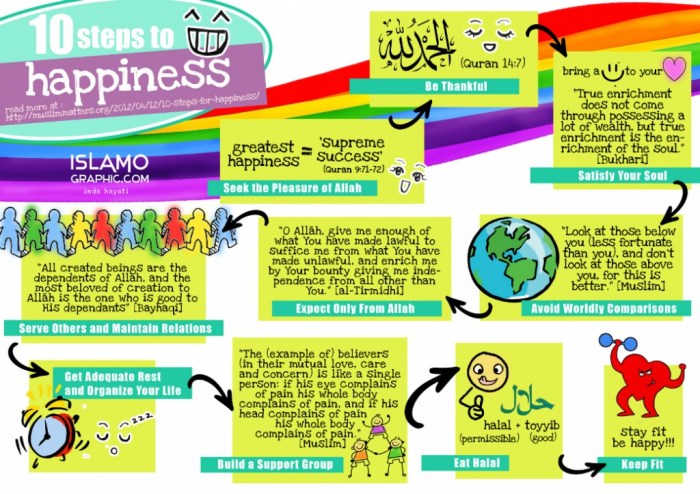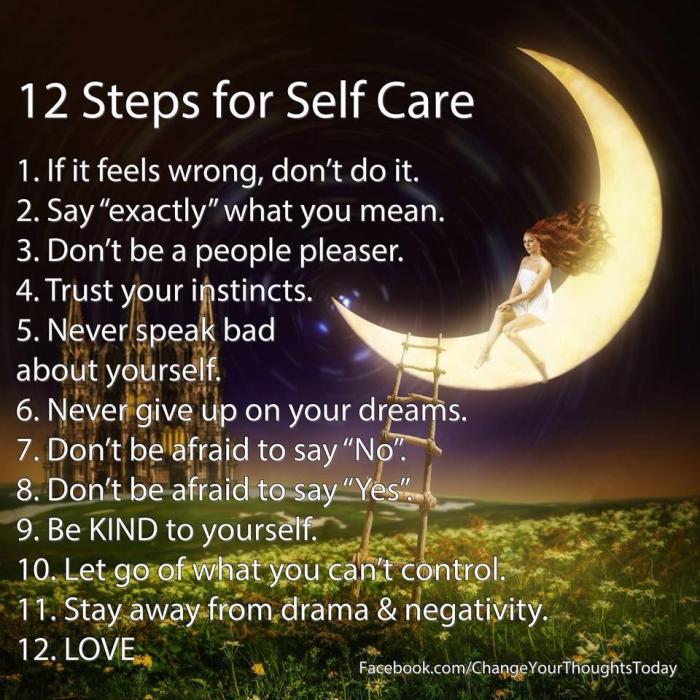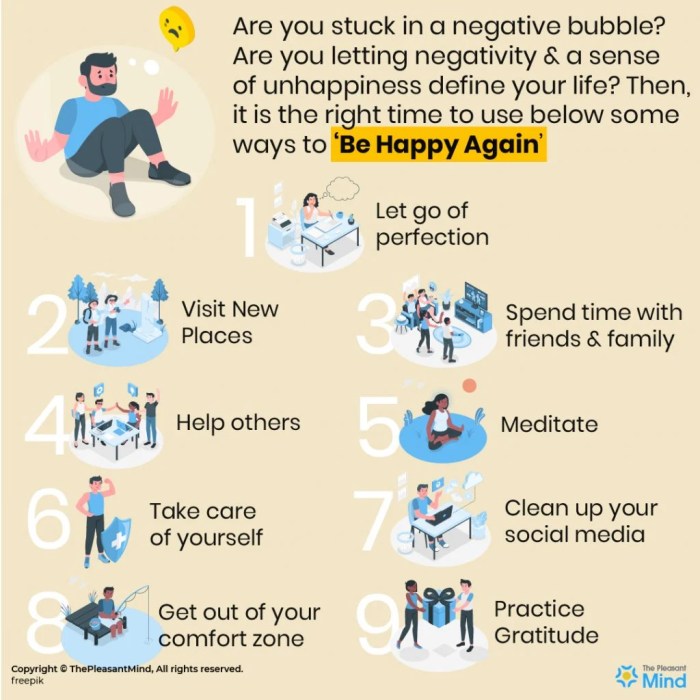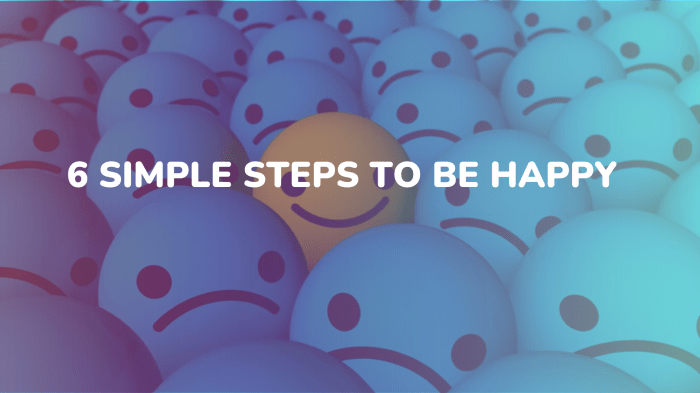How to Be Happy in 10 Steps is a journey towards discovering true happiness and fulfillment in life through actionable steps that can transform your well-being. From cultivating gratitude to embracing growth, each step is a building block towards a happier you.
This guide will provide you with practical insights and tools to enhance your happiness and lead a more meaningful life.
Introduction to Happiness

Happiness is a state of being that involves experiencing positive emotions, contentment, and satisfaction with one’s life and circumstances. It is not just the absence of negative feelings but the presence of joy and fulfillment.
Being happy is essential for overall well-being as it can improve physical health, mental health, and relationships. Research has shown that happy people tend to live longer, have stronger immune systems, and are more resilient in facing life’s challenges.
Positive Impact of Happiness
- Happiness can boost productivity and creativity, leading to better performance at work or in school.
- Happy individuals tend to have stronger social connections and more fulfilling relationships with others.
- Being happy can enhance one’s ability to cope with stress and adversity, promoting mental resilience.
- Studies have shown that happy people are more likely to engage in healthy behaviors and take care of their well-being.
Gratitude and Positive Thinking
Gratitude plays a crucial role in cultivating happiness as it shifts our focus from what we lack to what we have. It allows us to appreciate the present moment and acknowledge the good things in our lives. Positive thinking, on the other hand, contributes to a happier mindset by helping us reframe negative situations and approach challenges with optimism.
The Power of Gratitude
Practicing gratitude daily can have a profound impact on our overall well-being. Here are some practical tips to incorporate gratitude into your daily routine:
- Keep a gratitude journal and write down three things you are grateful for each day.
- Express your gratitude to others by saying thank you or sending a thoughtful note.
- Take a moment to reflect on the positive aspects of your day before going to bed.
The Benefits of Positive Thinking
Positive thinking can help us build resilience and cope with stress more effectively. Here are some ways to cultivate a positive mindset:
- Acknowledge and challenge negative thoughts by reframing them in a more positive light.
- Practice self-compassion and treat yourself with kindness and understanding.
- Surround yourself with positive influences and limit exposure to negativity.
Building Meaningful Relationships
Building meaningful relationships is a crucial aspect of happiness. Humans are social beings, and having strong social connections can significantly impact our overall well-being and sense of fulfillment. Nurturing and maintaining these relationships is key to leading a happier and more satisfying life.
The Importance of Social Connections
Strong relationships with friends, family, and loved ones provide us with a sense of belonging and support. These connections can help reduce feelings of loneliness and isolation, leading to increased happiness and overall life satisfaction.
Ways to Nurture and Maintain Meaningful Relationships
- Communicate openly and honestly: Effective communication is essential in any relationship. Express your thoughts and feelings, listen attentively, and work through any conflicts that may arise.
- Show appreciation and gratitude: Let your loved ones know how much they mean to you. Express gratitude for their presence in your life and the positive impact they have on you.
- Make time for quality interactions: Spend quality time with your loved ones, engaging in activities that bring you joy and strengthen your bond. Quality over quantity is key.
- Be supportive and empathetic: Show empathy and support towards your friends and family members. Be there for them in times of need and celebrate their successes with them.
- Resolve conflicts peacefully: Conflicts are a natural part of any relationship. Approach conflicts with an open mind, seek resolution through compromise and understanding, and learn from the experience.
Practicing Self-Care and Mindfulness
Self-care and mindfulness play crucial roles in promoting happiness and overall well-being. By taking care of ourselves and being present in the moment, we can reduce stress, increase positivity, and enhance our quality of life.
Significance of Self-Care Practices
Self-care practices involve activities that prioritize our physical, emotional, and mental health. Engaging in self-care allows us to recharge, rejuvenate, and maintain a healthy balance in our lives. It includes activities such as exercise, healthy eating, adequate sleep, setting boundaries, and engaging in hobbies that bring joy.
Benefits of Mindfulness, How to Be Happy in 10 Steps
Mindfulness is the practice of being fully present and aware of our thoughts, feelings, and surroundings without judgment. By cultivating mindfulness, we can reduce stress, improve focus, enhance self-awareness, and increase our overall sense of happiness. Mindfulness techniques like meditation, deep breathing, and mindful eating can help us stay grounded and centered in the present moment.
Self-Care Routines and Mindfulness Techniques
- Start your day with a morning routine that includes meditation, stretching, or journaling to set a positive tone for the day.
- Take short breaks throughout the day to practice deep breathing or mindfulness exercises to reduce stress and increase focus.
- Engage in regular physical activity such as yoga, walking, or dancing to boost your mood and energy levels.
- Prioritize self-care activities such as reading a book, taking a relaxing bath, or spending time in nature to unwind and recharge.
- Practice gratitude by keeping a gratitude journal or expressing appreciation for the little things in life to cultivate a positive mindset.
Setting Goals and Finding Purpose

Setting goals and finding purpose are essential components of leading a happy and fulfilling life. When we have clear goals that align with our values, we are more motivated, focused, and driven to achieve them, leading to a greater sense of satisfaction and happiness.
Identifying Personal Values
Identifying personal values is the first step in setting meaningful goals. Take some time to reflect on what truly matters to you in life. Consider your core beliefs, principles, and what brings you joy and fulfillment. Your values serve as a compass, guiding you towards goals that are in alignment with who you are and what you stand for.
- Reflect on past experiences that have brought you the most happiness and fulfillment.
- Consider the qualities you admire in others and aspire to embody in your own life.
- Think about what activities energize you and make you feel alive.
Aligning your goals with your values is the key to creating a sense of purpose and meaning in your life.
Aligning Goals with Values
Once you have identified your personal values, it’s important to align your goals with them to enhance your happiness and fulfillment. When your goals are in harmony with your values, you are more likely to stay motivated, overcome obstacles, and experience a greater sense of satisfaction when you achieve them.
- Set specific, measurable, achievable, relevant, and time-bound (SMART) goals that resonate with your values.
- Regularly review your goals to ensure they are still meaningful and aligned with your values.
- Break down larger goals into smaller, manageable steps to track your progress and stay motivated.
Engaging in Activities That Bring Joy
Engaging in activities that bring joy is essential for maintaining a positive mindset and overall happiness. By pursuing hobbies and interests that bring you pleasure, you can boost your mood and enhance your well-being.
Connection Between Hobbies and Happiness
Research has shown that participating in activities you enjoy can release endorphins, also known as “feel-good” hormones, which can elevate your mood and reduce stress levels. This connection between hobbies and happiness highlights the importance of incorporating enjoyable activities into your daily routine.
Examples of Joyful Activities
- Painting or drawing
- Gardening
- Playing a musical instrument
- Practicing yoga or meditation
- Cooking or baking
Pursuing Passions for a Fulfilling Life
When you engage in activities that align with your passions and interests, you are more likely to experience a sense of fulfillment and purpose. Whether it’s a creative outlet, physical activity, or a new skill you’re learning, pursuing your passions can lead to a more meaningful and satisfying life.
Cultivating Resilience and Emotional Intelligence: How To Be Happy In 10 Steps
Resilience and emotional intelligence play crucial roles in our overall well-being and happiness. Resilience helps us bounce back from setbacks and challenges, while emotional intelligence enables us to understand and manage our emotions effectively, as well as navigate relationships successfully.
Building Resilience
Resilience is the ability to adapt and thrive in the face of adversity. Here are some techniques to cultivate resilience:
- Practice self-care: Prioritize your physical and mental well-being to build inner strength.
- Develop problem-solving skills: Focus on finding solutions rather than dwelling on problems.
- Cultivate a positive mindset: Maintain optimism and look for silver linings in difficult situations.
- Seek support: Build a strong support network of friends, family, or a therapist to lean on in tough times.
Enhancing Emotional Intelligence
Emotional intelligence involves recognizing, understanding, and managing emotions effectively. Here are some strategies to improve emotional intelligence:
- Practice self-awareness: Identify and acknowledge your emotions to better control them.
- Develop empathy: Put yourself in others’ shoes to understand their perspectives and emotions.
- Enhance communication skills: Express your emotions clearly and listen actively to others.
- Manage stress: Utilize relaxation techniques like deep breathing or meditation to regulate emotions.
Practicing Acts of Kindness and Generosity
Acts of kindness and generosity play a significant role in enhancing one’s happiness and overall well-being. When we extend kindness towards others, whether through small gestures or larger acts of generosity, we not only positively impact the recipient but also experience a sense of fulfillment and joy ourselves.
The Impact of Altruism on Personal Well-being
Practicing acts of kindness and generosity has been scientifically proven to boost our own happiness levels. When we help others or show compassion, our brains release feel-good chemicals like dopamine and oxytocin, leading to an increase in positive emotions and a reduction in stress and anxiety. Moreover, altruism fosters a sense of connection and purpose, which are vital components of leading a fulfilling life.
Ideas for Incorporating Kindness into Daily Life
- Start your day with a simple act of kindness, such as sending a thoughtful message to a friend or family member.
- Volunteer your time or skills to a cause you care about, helping those in need while enriching your own sense of purpose.
- Practice active listening and offer support to those around you, showing empathy and understanding in your interactions.
- Perform random acts of kindness, like paying for someone’s coffee or holding the door open for a stranger, to spread positivity in your community.
- Create a gratitude journal to reflect on the kindness you receive and express appreciation for the good in your life, fostering a mindset of generosity and compassion.
Finding Balance in Life

Creating a balanced lifestyle is essential for overall happiness and well-being. Finding the right equilibrium between work, personal life, and self-care can lead to a more fulfilling and satisfying life.
Significance of Work-Life Balance
Work-life balance is crucial for maintaining good mental and physical health. It helps reduce stress, prevent burnout, and improve productivity and focus in both professional and personal aspects of life.
- Set boundaries: Establish clear boundaries between work and personal time to avoid overworking and ensure time for relaxation and social activities.
- Practice time management: Prioritize tasks effectively and allocate time for work, family, hobbies, and self-care to maintain a balanced lifestyle.
- Take breaks: Allow yourself regular breaks during work hours to recharge and avoid feeling overwhelmed or exhausted.
Benefits of Setting Boundaries and Managing Time
Setting boundaries and managing time efficiently can lead to increased productivity, better relationships, and overall well-being. It allows you to focus on what truly matters and avoid unnecessary stress and distractions.
- Improved focus: By setting boundaries, you can concentrate on tasks without distractions and increase your efficiency and effectiveness.
- Enhanced relationships: Clear boundaries help in maintaining healthy relationships by ensuring quality time with loved ones and avoiding conflicts due to work-related stress.
- Reduced stress: Effective time management reduces stress levels by preventing procrastination and allowing you to complete tasks in a timely manner.
Embracing Growth and Learning

Embracing growth and learning is essential for achieving lasting happiness and fulfillment in life. Personal growth allows individuals to evolve, adapt to change, and overcome challenges effectively. It enables them to discover their strengths, weaknesses, and values, leading to a deeper sense of self-awareness and purpose.
The Connection Between Personal Growth and Happiness
Personal growth and happiness are closely intertwined. When individuals commit to continuous learning and development, they experience increased self-confidence, resilience, and overall well-being. Embracing growth means stepping out of comfort zones, taking risks, and facing uncertainties with courage, which ultimately leads to personal transformation and a more meaningful life.
Importance of Continuous Learning and Development
- Continuous learning fosters intellectual curiosity and keeps the mind sharp and engaged.
- It allows individuals to adapt to new situations, acquire new skills, and stay relevant in a rapidly changing world.
- Personal development promotes self-improvement, boosts confidence, and enhances overall quality of life.
Ways to Embrace Challenges, Learn from Failures, and Grow Personally
- View challenges as opportunities for growth and self-discovery rather than obstacles.
- Cultivate a growth mindset by embracing failures as valuable learning experiences and opportunities for improvement.
- Set achievable goals, seek feedback, and reflect on experiences to identify areas for personal growth.
- Step out of comfort zones, try new things, and take calculated risks to expand your horizons and develop new skills.
End of Discussion
Embark on this transformative journey towards happiness by incorporating these 10 steps into your daily routine. By prioritizing self-care, meaningful relationships, and personal growth, you can create a life filled with joy and contentment.